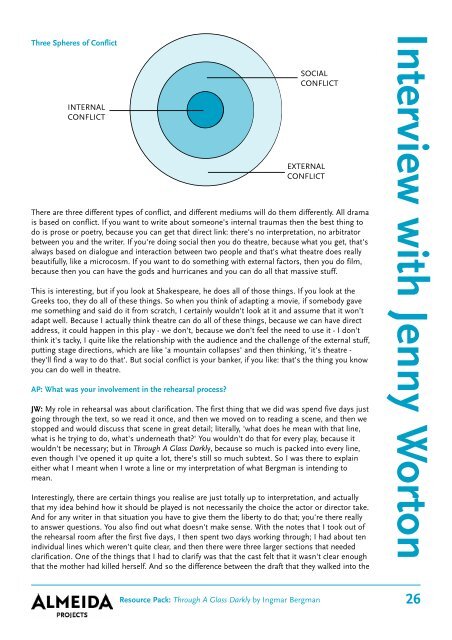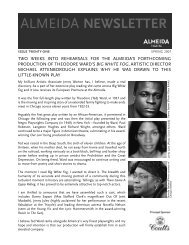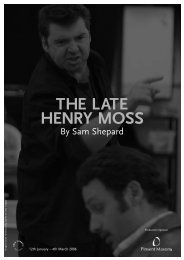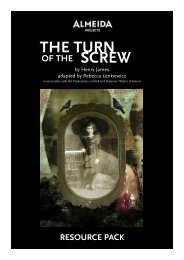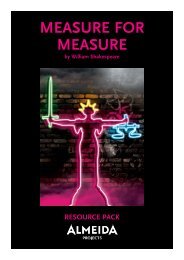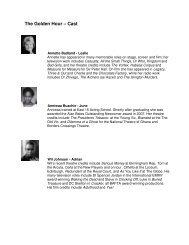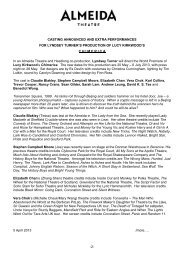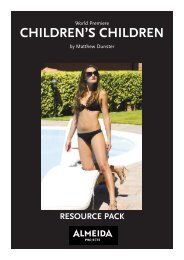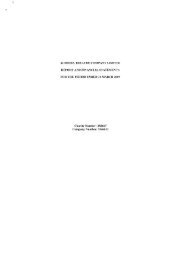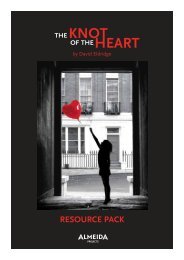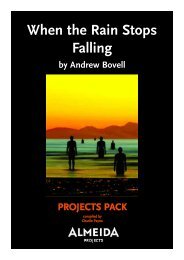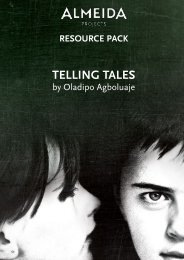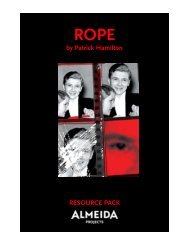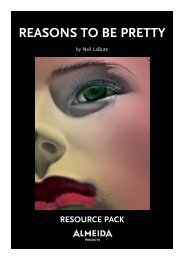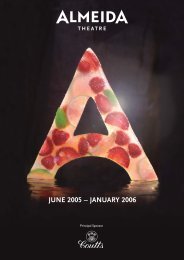Interview with Jenny Wortonready to fully produce it, we felt it would be good to be in a position where we could do hear it.Michael Attenborough had seen the script and he thought it was really interesting but also that itneeded work and requested another draft; Upton was very busy and realistically did not have time todo another draft.So we then asked Andrew if I could put in a few of the changes that he and Mike had talked aboutand that he had approved. At that point I went back and watched the film for the first time and I sawjust how different Andrew’s version really was. The first thing I did was cut all the additional materialhe'd added - he'd added more to the film and also changed the journey towards the focus being moreabout David, and the struggles of being a writer, and away from the young woman.AP: Whilst the dialogue is naturalistic, the play certainly has a distinct abstract element. How did yougo about creating that?JW: Whilst a lot of the adaptation was about dialogue and clarity, the other thing was capturingsomething in the film that feels genuinely poetic and stylistically not entirely naturalistic. I don't thinkany of Bergman's work is entirely naturalistic, it's all a bit odd. Whilst we didn't want to distanceourselves from the reality of the characters' emotions and their plights, we wanted it to feel that itwas entirely real. We did need to suggest something that comes across in the film that is stylistically alot more abstract. And also the landscape of her mind, which is where we find ourselves; althoughyou never actually ‘see’ that literally in the film. So out of that came very real dialogue, as real as youcould get it to be, played for keeps, but given a context and a background of a set and a creative worldwith the sound and light which is allowed to be more interpretive and more expressionistic.AP: What is the difference between an adapter and a playwright?JW: I think they're different skills, certainly in this case, because what you're doing is actually takingsomeone else's story, their concerns and you're transposing it into a different medium. A lot of whatyou're doing as an adapter is trying to work out how you can render a story successfully and try tostay faithful to someone else's vision. So in that sense you're more like a translator, and it doesrequire some of the same skills in the sense that you might have to restructure: you have to have agood sense of dramatic structure, and definitely I've drawn on all my dramaturgical skills, how youstructure something, what works well on stage and what doesn't work so well on stage. You have toknow what those things are - and obviously a playwright needs those things too - but also be able towrite convincing dialogue. In this case with <strong>Through</strong> A <strong>Glass</strong> <strong>Darkly</strong>, I've needed to, but with otherfilms, for example a Woody Allen film, if for whatever reason you wanted to adapt a Woody Allen film,you wouldn't need to be a great dialogue writer because why would you change the dialogue? But thisfilm is image led, rather than dialogue led.For me, emotionally, the biggest change that I've made is the ending. The way Bergman deals withfaith at the end and the way he talks about God, for me, is the most significant change. And I hope Ihaven't betrayed Bergman’s intention at all. What he does is goes from a place of almost no hope, orhopelessness, throughout the film, then at the very last moment, a sort of ‘God is love, God iseverywhere’ spirituality comes in, which later in his life, interestingly he rejected. He later said that hefelt he'd sort of ‘failed’ at the end of the film, and not held his nerve but instead pulled back and gonefor this catch-all, comfy ending. I've tried to tread a line which sits between those two things. So it'sneither as bleak as it would've been, had he made it ten years later and was absolutely an atheist; noris it a tacked-on ‘hopeful’ ending - I guess that comes from my own point of belief, of what feels realand right to me at the end of that play. So I guess you have to be a playwright and you have to be awriter in the sense that you have to find what your angle is on it.AP: What works on stage and what doesn't work on stage?JW: I can't answer that. If you go on a course on creative writing or adapting, they might show youthis diagramme:25Resource Pack: <strong>Through</strong> A <strong>Glass</strong> <strong>Darkly</strong> by Ingmar Bergman
Three Spheres of ConflictINTERNALCONFLICTThere are three different types of conflict, and different mediums will do them differently. All dramais based on conflict. If you want to write about someone's internal traumas then the best thing todo is prose or poetry, because you can get that direct link: there's no interpretation, no arbitratorbetween you and the writer. If you're doing social then you do theatre, because what you get, that'salways based on dialogue and interaction between two people and that's what theatre does reallybeautifully, like a microcosm. If you want to do something with external factors, then you do film,because then you can have the gods and hurricanes and you can do all that massive stuff.This is interesting, but if you look at Shakespeare, he does all of those things. If you look at theGreeks too, they do all of these things. So when you think of adapting a movie, if somebody gaveme something and said do it from scratch, I certainly wouldn't look at it and assume that it won’tadapt well. Because I actually think theatre can do all of these things, because we can have directaddress, it could happen in this play - we don't, because we don't feel the need to use it - I don'tthink it's tacky, I quite like the relationship with the audience and the challenge of the external stuff,putting stage directions, which are like 'a mountain collapses' and then thinking, 'it's theatre -they'll find a way to do that'. But social conflict is your banker, if you like: that's the thing you knowyou can do well in theatre.AP: What was your involvement in the rehearsal process?SOCIALCONFLICTEXTERNALCONFLICTJW: My role in rehearsal was about clarification. The first thing that we did was spend five days justgoing through the text, so we read it once, and then we moved on to reading a scene, and then westopped and would discuss that scene in great detail; literally, 'what does he mean with that line,what is he trying to do, what's underneath that?' You wouldn't do that for every play, because itwouldn't be necessary; but in <strong>Through</strong> A <strong>Glass</strong> <strong>Darkly</strong>, because so much is packed into every line,even though I've opened it up quite a lot, there's still so much subtext. So I was there to explaineither what I meant when I wrote a line or my interpretation of what Bergman is intending tomean.Interestingly, there are certain things you realise are just totally up to interpretation, and actuallythat my idea behind how it should be played is not necessarily the choice the actor or director take.And for any writer in that situation you have to give them the liberty to do that; you're there reallyto answer questions. You also find out what doesn't make sense. With the notes that I took out ofthe rehearsal room after the first five days, I then spent two days working through; I had about tenindividual lines which weren't quite clear, and then there were three larger sections that neededclarification. One of the things that I had to clarify was that the cast felt that it wasn't clear enoughthat the mother had killed herself. And so the difference between the draft that they walked into theInterview with Jenny WortonResource Pack: <strong>Through</strong> A <strong>Glass</strong> <strong>Darkly</strong> by Ingmar Bergman 26


